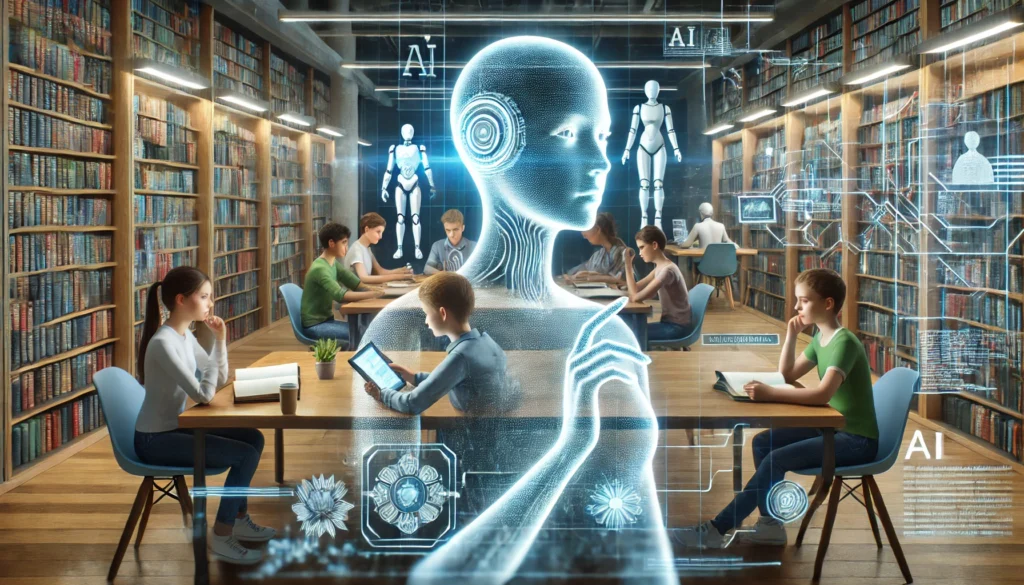As artificial intelligence reshapes our educational landscape, many educators and parents naturally wonder about its impact on students’ critical thinking and creativity. These concerns have sparked important conversations about how AI learning tools can best serve our educational communities while preserving the essential human elements of teaching and learning.
Today, we are exploring three recent studies that examine the relationship between AI tools, how human users delegate our thinking processes, and their impact on our creative and critical thinking abilities. Join me as we unpack these findings and discover what they mean for transforming our teaching approaches.
Summary of Three Studies
Gerlich, M. (2025). AI tools in society: Impacts on cognitive offloading and the future of critical thinking. Societies, 15(1), 6. Retrieved from: https://www.mdpi.com/2075-4698/15/1/6
Gerlich’s study presents a comprehensive examination of how AI tool usage affects human cognitive processes and critical thinking abilities. Employing a mixed-methods approach, the research analyzed survey data from 666 participants and included 50 semi-structured interviews. The study’s findings suggest that increased reliance on AI tools for complex decision making may lead to reduced critical thinking abilities, while balanced use of AI—which emphasizes using AI primarily for streamlining administrative tasks and freeing up cognitive resources for verification and more complex tasks— preserve critical thinking abilities. The research highlights the complex interplay between AI tool usage and human cognitive capabilities.
Lee, H-P., Sarkar, A., Tankelevitch, L., Drosos, I., Rintel, S., Banks, R., & Wilson, N. (2025). The Impact of Generative AI on Critical Thinking: Self-Reported Reductions in Cognitive Effort and Confidence Effects From a Survey of Knowledge Workers. In CHI Conference on Human Factors in Computing Systems (CHI ’25), April 26–May 01, 2025, Yokohama, Japan. ACM, New York, NY, USA. https://www.microsoft.com/en-us/research/wp-content/uploads/2025/01/lee_2025_ai_critical_thinking_survey.pdf
Lee et al.’s study investigates how knowledge workers perceive and enact critical thinking when using Generative AI (GenAI) tools through analysis of a survey data from 319 knowledge workers and 936 real-world examples of GenAI use in workplace tasks. The research finds that users’ task-specific self-confidence and confidence in GenAI are predictive of critical thinking engagement, with higher AI confidence associated with less critical thinking and higher self-confidence associated with more critical thinking. The findings show that GenAI shifts the nature of critical thinking toward information verification, response integration, and task stewardship, while also revealing challenges in awareness, motivation, and ability to think critically when using these tools.
Tang, K. S., Cooper, G., Rappa, N., Cooper, M., Sims, C., & Nonis, K. (2024). A dialogic approach to transform teaching, learning & assessment with generative AI in secondary education: A proof of concept. Pedagogies: An International Journal. Retrieved from https://doi.org/10.1080/1554480X.2024.2379774
Tang et al.’s study examines the integration of GenAI in secondary education through a dialogic approach has revealed promising insights into transforming teaching and learning practices. Conducted in an Australian independent school, the research involved four teachers organized into three action research teams focusing on critical questioning, assessment, and differentiation. The study reframed GenAI as a dialogic partner rather than merely a knowledge provider. This innovative approach demonstrated significant benefits, including active student engagement in AI dialogues, enhanced critical thinking through follow-up questioning, and successful integration of multiple perspectives in learning. The research particularly emphasized the importance of human expertise in validating AI-generated content and promoted the ethical use of AI tools in educational settings.
New Opportunities to Cultivate Critical Thinking and Educational Excellence
These three studies about AI tools’ societal impact raise important considerations about cognitive offloading—the tendency to rely on external tools for thinking tasks. While this presents legitimate concerns, it also reveals opportunities for intentional instructional design that promotes active engagement rather than passive consumption.
Colleague AI’s Approach: Fostering Critical Thinking Through AI
Colleague AI’s design aligns with these research insights. We have developed a framework that transforms potential challenges into opportunities for deeper learning:
1. Facilitating Student Discourse
- Encourages students to engage in meaningful dialogue with AI by drafting deep thinking pedagogical strategies.
- Guides active thinking without directly feeding the correct answers to students’ inquiries.
- Promotes collaborative knowledge co-construction among AI, teacher, and students.
- Supports multiple perspective integration in generated lesson materials.
2. Developing Both Educators and Students’ Critical Thinking Skills
- Demonstrates transparent thinking processes of AI to allow users to effectively guide AI’s content generation and easily correct potential errors.
- Encourages reflection and metacognition through technological innovations in lesson material quality ratings, simulation, and nudging algorithms.
- Guides students through analytical reasoning steps, enabling flexible pace and depth of exploration.
3. Reimagining Assessment and Homework
- Focuses on mastery- and standard-based grading practices rather than simply offering students’ letter grades.
- Enables ongoing dialogue between students, teachers, and AI during assessment and homework completion.
- Allows for multiple attempts and resubmissions to demonstrate knowledge mastery and continuous grwoth.
- Supports teachers with offering detailed, growth-oriented feedback to students.
The Path Forward
The integration of AI in education isn’t about replacing human thinking but enhancing it. Through structured dialogue, thoughtful implementation, and focus on critical engagement, we can harness AI’s potential while developing essential thinking skills. The key lies in viewing AI not as an authority but as a collaborative tool that supports human learning and maximize efficiency.
As we continue to navigate this educational transformation, platforms like Colleague AI, demonstrate thoughtful technological innovations can be leveraged to deepen rather than diminish critical thinking, creating more engaging and effective learning experiences for all students.

